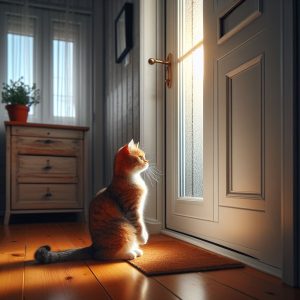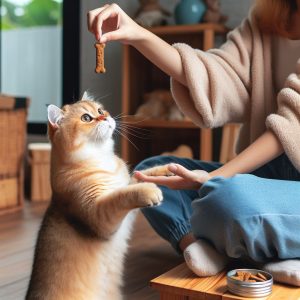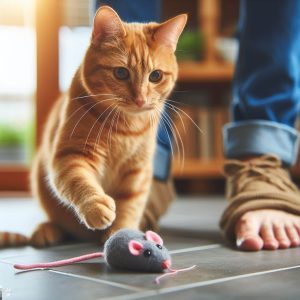Has your aging feline friend lost interest in their favorite food? Does your senior cat only lick their meals instead of devouring them? You fill their bowl, but return later to find they’ve only nibbled. Sound familiar? If so, you’re not alone.
Many cat parents become concerned when their older cat stops eating but continues drinking water as usual. While a decreased appetite in cats is common as they age, it still warrants your attention to determine the underlying cause. Especially if accompanied by lethargy, weight loss or other symptoms.
In this comprehensive guide, we’ll cover the following:
- Common reasons older cats stop eating
- Dangers of decreased appetite in senior cats
- Tips to encourage your older cat to eat
- When to seek veterinary help
Let’s start by exploring some of the most common causes of appetite loss in cats over 7 years old.
Common Causes of Appetite Loss in Senior Cats
There are many reasons your aging cat may turn up their nose at food. Here are some of the most common causes of reduced appetite in older felines:
Dental Disease
Over 80% of cats over age 3 have some form of dental disease – periodontal disease, stomatitis, abscesses, and tooth resorption. Any oral health issues can make chewing kibble or even wet food unbearable. Cats are masters at hiding pain. So your cat may still drink but not eat if mouth pain inhibits chewing or swallowing. Have your vet examine your cat’s mouth to identify any problems. Professional dental cleanings and extractions can often reverse tooth and gum disease, dramatically improving appetite.
Cancer
Cancer is unfortunately common in senior cats. Certain cancers like those of the mouth, throat, stomach, and intestines can impede eating. Cancerous growths cause obstructions making swallowing difficult. While decreased appetite is a symptom of cancer, it can also result from cancer treatments like chemotherapy. Consult your vet if you notice any lumps, unusual odors, or bleeding from the mouth. Catching cancer early vastly improves survival odds.
Chronic Kidney Disease
Chronic kidney disease (CKD) affects many older cats, impairing kidney function. Toxins build up in the bloodstream, causing nausea and decreased appetite. Cats in renal failure need medical intervention to control symptoms and slow disease progression. Work with your vet to provide hydration, medications, and a renal-friendly diet. Controlling CKD can significantly boost appetite and quality of life.
Hyperthyroidism
An overactive thyroid gland is common in senior cats. Hyperthyroidism speeds up metabolism, causing weight loss, increased appetite, and other effects. But in later stages, nausea and loss of appetite emerge. Medications, radioactive iodine therapy, diet change, or surgery can treat hyperthyroidism, returning your cat’s metabolism and appetite to normal.
Gastrointestinal Disorders
Vomiting, diarrhea, constipation, inflammatory bowel disease (IBD), pancreatitis – older cats face higher risks of digestive issues. Any GI problem can diminish appetite. Seek veterinary diagnostics to determine the specific disorder. Then, follow your vet’s treatment plan which may include medications, dietary changes, or supplements. Proper management of gastrointestinal conditions often restores appetite.
Medication Side Effects
Does your older cat take any regular medications? Prescription drugs can potentially cause appetite loss as a side effect. Common culprits include non-steroidal anti-inflammatories, chemotherapy, antibiotics, and steroids. Review all your cat’s medications with your vet. Dosage adjustments or alternative drugs may alleviate medication-induced appetite suppression.
Stress or Anxiety
Cats are creatures of habit. Changes to their environment or routine can stress older cats. A new home, pet, baby, or family member introduced late in life can overwhelm them. Noise, construction, or house guests may also induce anxiety. Make sure your cat has a dedicated quiet space. And stick to consistent feeding times and rituals. Consider calming supplements or pheromone diffusers as needed.
Decreased Sense of Smell
A diminished sense of smell is a side effect of aging. With a dulled sniffer, your cat may no longer find their food appetizing. The aroma and flavor become less palatable. Try warming wet foods to release more scent. Or add tasty mix-ins like nutritional yeast, parmesan, or chicken broth. Switching to smelly, savory foods may entice your senior cat to clean their plate.
Metabolic Changes
Like humans, a cat’s metabolism slows as they age, lowering calorie needs. Where your cat once scarfed multiple meals a day, they may naturally become a grazer. Break meals into smaller portions, available throughout the day. Or switch to a high-calorie food so they meet needs with less volume. What looks like disinterest may simply be an aging metabolism in action.
Dangers of Decreased Appetite in Older Cats
Now that we’ve covered some potential causes for appetite decline in senior cats, let’s talk about why it’s so important to restore interest in food. When cats stop eating, it can quickly jeopardize their health. Here are some of the biggest risks of appetite loss in older cats:
Hepatic Lipidosis
Also called fatty liver disease, hepatic lipidosis can develop in as little as two days of decreased eating. It’s a life-threatening condition seen most often in overweight, older cats. When a cat stops eating, their body starts breaking down fat reserves. But the liver can’t process all the fat, causing a dangerous buildup in liver cells. Intensive veterinary treatment is required to reverse lipidosis. Prevention through prompt appetite stimulation is key.
Muscle Loss
Failing to eat adequate protein leads to loss of muscle mass and strength. Immobility and inability to groom, use the litter box, or feed themselves can result. Weakness in senior cats can start a detrimental spiral of worsening health. Help your older cat maintain strong muscle tone through adequate nutrition.
Nutritional Deficiencies
In addition to protein deficiency, inadequate calorie and nutrient intake can cause an array of problems – from anemia and immune deficiency to poor skin and coat health. Optimizing nutrition is crucial for managing diseases and maintaining quality of life as your cat ages.
Weight Loss
While some weight loss is normal with aging, rapid or excessive weight loss is cause for alarm. Senior cats can ill afford to lose pounds they desperately need. Seek medical intervention for any cat losing more than 10% of their body weight.
Fatty Liver Disease
As mentioned earlier, when overweight cats stop eating, fatty liver disease can develop quickly. Senior cats already prone to obesity face the highest risks. But even average-weight older cats are vulnerable. Addressing any underlying illness while also stimulating the appetite is critical in preventing this deadly outcome.
The bottom line? Allowing reduced appetite and food intake to continue unchecked in an older cat can have grave consequences. Don’t write it off as just a normal part of aging. Consulting your vet at the first signs of appetite decline is extremely important. The sooner you can identify the root cause and implement solutions, the better the outcome for your feline companion.
Tips to Help Your Senior Cat Eat
Alright, so you know why restoring your senior cat’s appetite is vital. What practical steps can you take at home to encourage eating? Try these tips to stimulate appetite and nourish your aging kitty:
Have Regular Vet Checkups
As we’ve covered, myriad age-related diseases and conditions can suppress appetite. Having twice-yearly senior wellness checkups enables early detection and treatment. Don’t skip your cat’s appointments. The tests performed help diagnose problems like dental disease, kidney disease, thyroid disease, cancer, and more. Your vet can also recommend dietary adjustments based on your cat’s health.
Address Dental Problems
Untreated dental disease is a very common reason for reduced eating in older cats. Make sure your vet performs a thorough oral exam at every visit, looking for resorption, gingivitis, loose or infected teeth, masses, and other problems. Be proactive about professional dental cleanings and extractions to ensure your cat’s mouth stays healthy. This simple step alone could be the solution to your cat’s appetite woes.
Discuss Medications with Your Vet
If your senior cat takes any long-term medications, review drug names, dosages, and side effects with your vet. Adjustments may alleviate suppressive side effects. Also, ask about supplements like mirtazapine that stimulate appetite. Short-term use under veterinary guidance can help get your cat eating again.
Try Warming the Food
Gently heating wet food releases more aroma, which enhances flavor for cats with diminished sense of smell. Microwave 5-10 seconds or place in a warm water bath. Stir thoroughly checking for hot spots before serving. Just a subtle increase in food temperature can make it more enticing. This trick often works to encourage disinterested senior cats.
Offer Multiple Small Meals
Instead of one or two large meals, give smaller portions several times a day – breakfast, morning snack, lunch, afternoon snack, dinner. The more opportunities, the better chance your senior cat has to eat enough. Especially helpful for cats with nausea, oral pain, or digestive issues. Or those on medications that must be taken with food.
Hand Feed or Assist Feed
If your arthritic or weak senior cat struggles to bend down to their bowl, assist them. Hand feed morsels while petting and praising. Or use shallow plates raised on a platform or step stool to reduce effort. You can also hold dishes at nose level during mealtimes. Make eating easier to prevent surrendering to hunger.
Try New Food Textures & Flavors
Stickiness, crunch, juiciness – different food textures entice picky palates. Run wet food through a blender or food processor to make a smooth, brothy “soup.” Add heated water to dry to soften. Or mix in crunchy toppers like freeze-dried treats. For new flavors, add a teaspoon of human foods like nutritional yeast, parmesan, baby food, bone broth, or tuna juice.
Stimulate Appetite with Play
Get those predatory juices flowing! Spark your senior cat’s interest in food by mimicking hunting. Drag string toys, wave a feather wand, shine a laser pointer, rattle treat balls. A short 5-10 minute play session before meals to work up their appetite can do wonders. Useful for cats who still have some mobility and “oomph.”
Eliminate Stress Triggers
Determine if any changes or stressors are impacting your senior cat’s normal routines. Limit disruptions and stick to consistent mealtimes. Give them a dedicated quiet space to retreat to. Address conflicts with other household pets. Reduce noise and activity in feeding areas. Maintain their schedule, environment, and limit stress to remove barriers to eating.
Add Nutritional Supplements
High-calorie gel supplements like Tomlyn Nutri-Cal provide easy to digest nutrition when appetites lag. They come in lickable tubes or gels. Also consider omega fatty acid supplements to reduce inflammation and improve coat health. And fortified broths or vitamin syrups add key nutrients to your cat’s diet. Consult your vet before starting supplements.
Monitor Water Intake
While it may seem like a good sign your cat is still drinking, increased thirst can signal medical issues like kidney disease or diabetes. Measure water intake and contact your vet if output spikes or you notice frequent urination. Senior cats especially need ample hydration, but excessive drinking warrants examination. Investing in a pet fountain can encourage water consumption.
Weigh Your Cat Weekly
Closely monitoring your senior cat’s weight is one of the most effective ways to catch health issues early. Buy a pet scale, and weigh them at the same time each week. Any loss of 1-2% body weight per week is concerning. Rapid weight loss in cats is a medical emergency requiring immediate vet intervention. Tracking weekly weights enables you to identify and address problems before they become critical.
Consider Assisted Feeding
In severe cases of appetite decline, temporary assisted feeding may be needed to sustain your cat. Your vet can show you how to safely use a syringe or feeding tube to deliver prescription recovery foods. Assisted feeding requires training and monitoring to avoid aspiration. But it can serve as a lifeline for cats refusing to eat on their own. It’s a short-term fix giving you time to address the underlying cause.
The key is finding whichever unique tricks motivate your individual cat to eat. It may take some trial and error, but persistent tinkering with food types, textures, and presentation is often rewarded. Enlist your vet’s help to ensure any medical issues intensifying appetite loss are also resolved.
When Should You Take Your Cat to the Vet?
We’ve covered lots of home interventions to try and entice your senior cat to eat. But how do you know when it’s time to seek medical attention? Here are some clear signs your cat needs prompt veterinary care:
- Weight loss exceeding 1 pound per week
- No interest in ALL foods for over 2 days
- Signs of nausea, vomiting, or diarrhea
- Difficulty chewing or swallowing
- Loss of energy, lethargy, weakness
- Hiding, depressed, anti-social behavior
- Excessive thirst or urination
- Obvious lumps, swelling, or oral bleeding
Don’t try to “wait it out” if your cat shows any of the above symptoms in combination with inappetence. Call your vet promptly. Senior cats can decline quickly without intervention. The sooner underlying issues are diagnosed and treated, the better the chance of recovery.
Some key diagnostics your vet may perform include:
- Bloodwork to check organ function and identify abnormalities indicating illness
- Urinalysis to assess kidney function and check for excess glucose
- Oral exam to diagnose dental disease, masses, and ulcers
- Palpation to feel for thickened intestines or abdominal masses
- Imaging tests like x-rays, ultrasound, and CT scans to visualize internal organs
- Biopsies of abnormal growths to test for cancer
Based on exam and diagnostic findings, your vet will recommend a targeted treatment plan. This could include:
- Emergency hospitalization for IV fluids, nutrition, and monitoring if needed
- Medications to control vomiting, boost appetite, or manage pain
- Professional dental cleaning and tooth extractions to treat oral disease
- Special therapeutic kidney or gastrointestinal diets
- Surgery to remove cancerous masses or obstructions
- Radioactive iodine therapy for hyperthyroidism
- Ongoing lab testing to monitor organ function and disease
Don’t lose hope if your aging kitty stops eating. While declined appetite can seem like “normal aging,” it often reflects treatable medical conditions. Supporting your cat’s wellbeing, enriching their environment, monitoring them closely, and working hand-in-hand with your vet can help get them nibbling—and thriving—once again.
The Takeaway: Rev Up Your Cat’s Appetite
In summary, here are the key steps for addressing appetite loss in your older cat:
- Have regular vet exams to diagnose underlying illness
- Address dental disease and oral pain as a priority
- Rule out medication side effects impacting appetite
- Stimulate appetite with warming, texture changes, hand feeding
- Reduce stress and stick to consistent routines
- Supplement diet with high-cal energy gels or broths
- Weigh weekly and track water intake
- Seek prompt vet care at any sign of rapid weight loss or nausea
A decreased appetite in your senior cat is usually indicative of a manageable medical condition rather than simply “fussiness.” With some detective work and a veterinary-guided strategy, you can get your older cat eating—and thriving—once again. Prioritizing appetite is key to maximizing their health and longevity.



